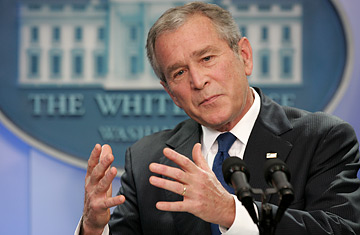
President Bush speaks at a press conference at the White House on October 17.
President George W. Bush famously said he doesn't do nuance, but when you're a lame duck who is waging an unpopular war and besieged by criticism, subtlety can be a crucial ally. Bush showed he has embraced the expediency of obfuscation, needle-threading and veiled criticism at his press conference Wednesday as he nuanced his way through questions on the role of Blackwater in Iraq, America's troubled relations with Russia and condemnation by his former top Iraq commander.
Bush still breaks out the rhetorical ball peen hammer when he can, of course. He stubbornly dodged questions about the Sept. 6 attack by Israel on suspected nuclear weapons sites in Syria and, when pressed, shot back at persistent reporters, "This is not my first rodeo." Asked what his definition of torture is, he repeated the now near-meaningless assertion, "We don't torture." On diplomatic efforts to curtail Iran's nuclear program, he said he had told third countries, "If you're interested in avoiding World War III, it seems like you ought to be interested in preventing [Iran] from having knowledge necessary to make a nuclear weapon."
But the answers got a lot mushier on several of the thornier problems he faces in his remaining 15 months in office. When Bush was asked about Russian President Vladimir Putin's authoritarian tendencies, he said in dealing with foreign leaders he tries "to be in a position where I actually can influence people, and one way to do that is to have personal relationships that, that enable me to sit down and tell people what's on my mind without fear of rupturing relations." In other words, like any subtle diplomat, Bush underplays disagreement and emphasizes consensus when dealing with autocrats.
On Iraq, Bush accepted responsibility for the activities of military contractors like Blackwater, which is under investigation on Capitol Hill and in Baghdad for its use of force in Iraq. But he split the difference on defending them, saying they were performing a useful function there and praising their "sacrifice", while saying he would be "anxious to see the analysis of their performance" in Iraq.
Perhaps the most surprising moment of nuance came when Bush responded to a question about the scathing criticism leveled against the Administration by the former top commander in Iraq, Gen. Ricardo Sanchez, who said recently that national leaders had been incompetent in their prosecution of the war. At first, Bush seemed to give the ex-General a pass, saying, "I admire General Sanchez's service to the country." But then he said, "The situation on the ground has changed quite dramatically since he left Iraq." If you wanted to be generous, you could read that as meaning Sanchez' criticisms are out of date. But the other obvious meaning is, "Things have gotten a lot better now that he's no longer in charge."
For all his soft-shoeing subtlety, Bush is still a long way from Clintonesque legerdemain. But as power drains from the White House and tough international issues remain insoluble, we can expect more frequently to see a shaded worldview from the man who once cherished his moral clarity.
